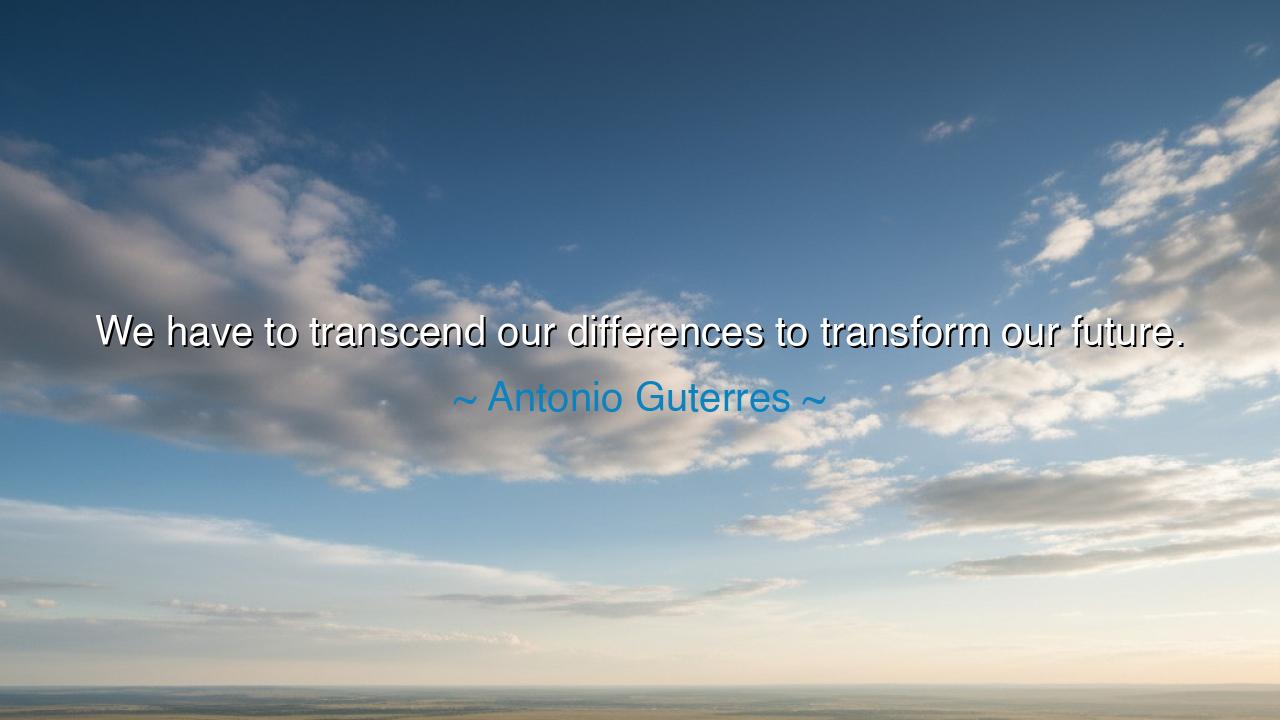
We have to transcend our differences to transform our future.






On Unity Beyond Division and the Birth of a Shared Future
When Antonio Guterres, the Secretary-General of the United Nations, declared, “We have to transcend our differences to transform our future,” he spoke not only as a diplomat but as a prophet of the modern age — one who understands that humanity’s greatest test is not found in the power of nations, but in the hearts of individuals. His words resound like a call from the mountaintop: a call to rise above the walls of tribe, creed, race, and ideology that have long divided the children of the same Earth. To transcend our differences is not to erase them, but to rise beyond them — to see, as the ancients did, that diversity is not the enemy of harmony, but its foundation.
Guterres’s words are born from the spirit of his office — from decades spent in the pursuit of peace and human solidarity. As the leader of an organization built in the aftermath of world war and ruin, he has witnessed both the grandeur of human potential and the depths of our division. The United Nations was founded on the ashes of conflict, by those who had seen the horrors that come when difference becomes hatred. Thus, his statement is not merely idealism, but hard-earned wisdom: that our survival, as nations and as a species, depends upon our ability to work together. We cannot build a just world while clinging to the barriers that keep us apart.
To transcend differences is, in essence, a spiritual act. It demands that we look beyond the narrow self, beyond the illusion that our group, our belief, or our perspective alone defines truth. The ancient philosophers spoke of this in their own ways. The Stoics taught that all men are citizens of one great city — the cosmos. The Indian sages proclaimed Vasudhaiva Kutumbakam — “the world is one family.” And the early Christians spoke of the “body of humanity,” in which every person is a vital part of the whole. Across all ages and civilizations, the wise have known what Guterres now reminds us: that to secure the future, we must first awaken to our shared belonging.
Consider the story of Nelson Mandela, a man whose life stands as a living testament to this truth. Imprisoned for twenty-seven years under a system built on racial division, he emerged not seeking vengeance, but reconciliation. He understood that to heal South Africa, he had to unite the oppressed and the oppressor alike — to transcend difference for the sake of the nation’s rebirth. When he walked out of prison, he carried not bitterness, but vision; not anger, but forgiveness. His leadership proved that when humanity chooses understanding over hatred, it can transform its future. The miracle of South Africa’s peaceful transition remains one of the greatest acts of collective transcendence in modern history.
Yet, Guterres’s words extend beyond politics and nations; they speak to every life, every heart. In our families, our communities, our workplaces — we see how division poisons what could otherwise flourish. We quarrel over beliefs, backgrounds, and wounds, forgetting that all people seek the same essentials: dignity, belonging, and hope. To transcend differences is to choose empathy over ego, to listen before speaking, to find the thread of humanity that runs through every person we meet. Only when we do this on a small scale can we hope to achieve it on a global one. For the world is not changed by governments alone — it is transformed by individuals who dare to see others as mirrors of themselves.
There is also a deeper wisdom in his choice of words: to transform the future. Transformation is not restoration — it is renewal. It is the act of building something greater than what existed before. To transform the future means to envision a world not merely repaired, but reborn — a world where collaboration replaces competition, where compassion becomes a global force as mighty as any army, where difference becomes strength rather than fracture. This is not a dream for the naïve, but a necessity for the wise. For the challenges we face — climate change, inequality, war, displacement — do not recognize borders or beliefs. They demand unity, or they will destroy us all.
The lesson, then, is clear: we must each become architects of unity. The transformation of the world begins not in grand speeches, but in daily acts of understanding. When you forgive, you transcend difference. When you listen, you build peace. When you choose cooperation over pride, you shape the future. Let your thoughts, your work, and your words serve the greater harmony of humankind. And when you meet division — whether in yourself or in the world — remember Guterres’s wisdom: the future is not written by those who cling to the past, but by those who dare to rise above it.
Thus, his message becomes both warning and promise. If we remain divided, our future will crumble beneath the weight of our own blindness. But if we rise together — if we transcend, if we unite — we will build an age more luminous than any before it. For in the end, our destiny is shared, our survival intertwined. The river of humanity flows in many streams, but it must converge if it is to reach the ocean of peace. And so, let every generation remember this truth: to transcend difference is to secure the future; to unite is to endure.






AAdministratorAdministrator
Welcome, honored guests. Please leave a comment, we will respond soon